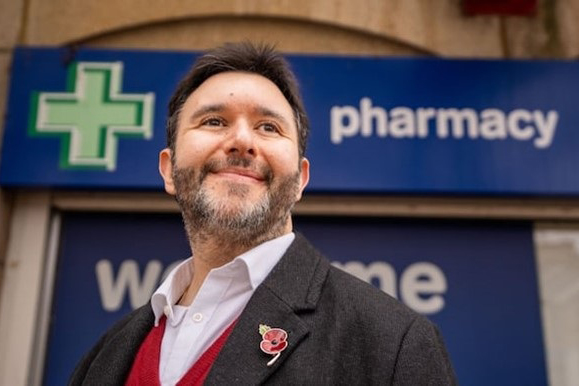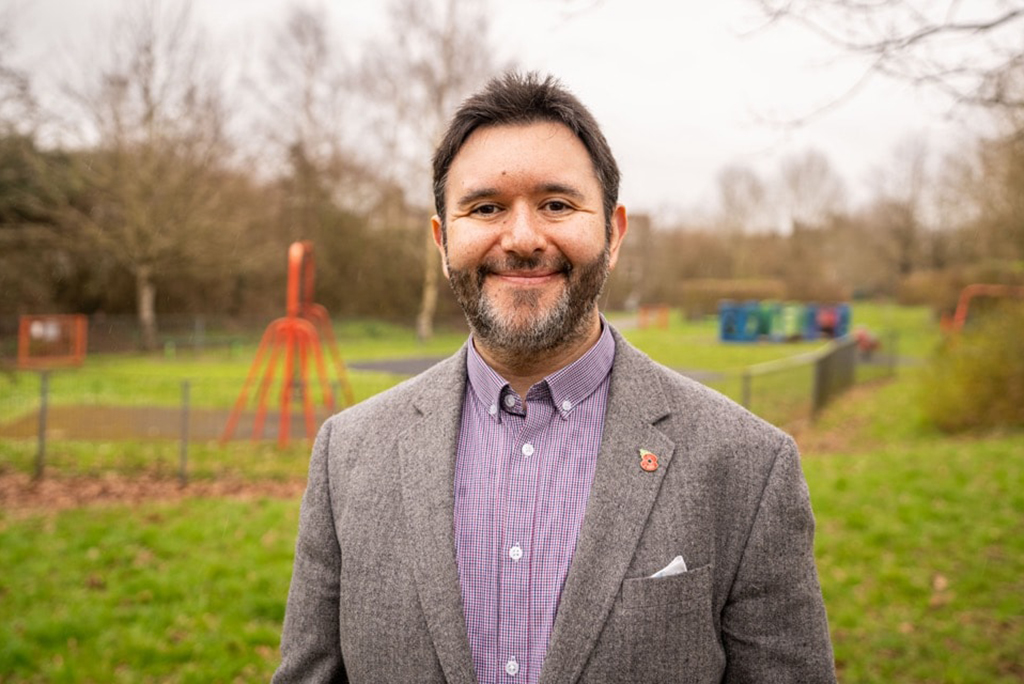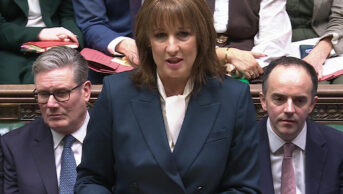
www.sadikalhassan.co.uk
Sadik Al-Hassan’s parliamentary office sits in a quiet corner of Portcullis House: for me, a rare glimpse behind the scenes of government. I meet him there, having been escorted through the winding corridors, and I am struck by the quiet after the bustle of the central lobby.
We chatted about when I visited Portcullis House to speak to Taiwo Owatemi — pharmacist and Labour MP, and former chair of the All-Party Parliamentary Group on Pharmacy (APPG). Al-Hassan clearly holds Owatemi in great regard. “We get on very well. As pharmacists, we have that shorthand: we get what we’re talking about. She’s incredibly bright and, as a government whip, she’s incredibly connected to the health agenda.”
Pharmacist Al-Hassan — elected as Labour MP for North Somerset in July 2024, taking the seat from Conservative MP Liam Fox — was elected as chair of the APPG in October 2025. Alongside his parliamentary role, he’s still deeply plugged into issues facing the pharmacy sector.
What made you want to enter politics?
When I was younger, I was very interested in politics. Then life happened and I looked for a career that fitted my interests of sciences and maths. I found pharmacy and for a long time I didn’t focus on politics at all, until the birth of my second child. Both my children were born early and they spent a lot of time in the local hospital, Southmead.
Pharmacists are quite analytical. We’re problem and solution focused. And, in politics, I like to think I exemplify some of that
The birth of my second child was one of the reasons I got involved in politics because I saw the same place, same facilities, some of the same people, but fewer of them, and some of the roles filled with volunteers. That slap in the face of seeing the neonatal intensive care unit (NICU) situation really resonated with me and I thought, ‘I need to do something’. I decided which political party fitted my views and joined it. I set up a local NHS meeting with a GP and a nurse I knew to talk to local residents. Then I stood as a councillor, then I was deputy mayor and eventually I became an MP. So it was from the idea of wanting to fix things that I saw broken in the system.
You’ve held quite a lot of different roles on the way…
I was superintendent of the fourth largest pharmacy in the UK at the time. Previously, I held a lot of roles within multiples. I sat on the local pharmaceutical committee for Avon and Devon. There is a lot of crossover between the skills important to be a good pharmacist and the skills important to be a good politician: listening skills, building rapport, understanding concepts, adapting language for the person in front of you. All of these are consultation skills.
What sort of impact can pharmacists have if they come into politics?
They have that ability to engage well. But pharmacy is a profession that’s built on a basis of legality, science, continuing professional development and education, patient or customer contact. These are all things that are important to grasp in politics. Pharmacists are quite analytical. We’re problem and solution focused. And, in politics, I like to think I exemplify some of that.
I look at some of the situations that affect my constituents, the problems they face and I look at the possible solutions — the stakeholders I need to engage to get there and how I can deliver it. Delivery is a really important part of pharmacy and it is a really important part of politics. In 2025, politicians need to have physical things that they can point at to show what they’re doing because just saying that something is important is not enough. We need to be fixing it.
What are the biggest issues that the All‑Party Parliamentary Group on Pharmacy is focusing on right now?
The APPG has recently done a lot of work on medicine shortages, some work on what the vision of pharmacy will be in the next few years, but it’s also addressing some of the gap in the translation of the ten-year plan.
That plan is a vision document for what the NHS goals will be for ten years’ time, but what does it look like for a patient who attends a pharmacy in 2035? What does it look like for a pharmacist who works in that role? What are they doing, how are they doing it? This is the chance for pharmacy to take a chunk of what it should always have been doing, and deliver it well, to build that future vision. The work that the APPG is focusing on helps us crystallise what that looks like for the profession, not just the employer.
We’re not cheap doctors or expensive nurses — we’re experts in medicines
One of the things that I’m always worried about for pharmacy is the vision of what it is when it grows up. If you look at what we do now, and what I like to call the safe professional space for a pharmacy, we tend to be overlapping in some of our goals, our movements, into other areas of profession. We’re not cheap doctors or expensive nurses — we’re experts in medicines — so I try to confine my thoughts to what I think is the best thing for pharmacists, pharmacy technicians, for healthcare assistants to do within the scope of our practice.
The future of pharmacy doesn’t just sit with medicines supply, but also prescribing, because — within the role of our competence — that’s what we do best. It is literally our job as a profession to check the homework of prescribers, so we must know prescribing better than the people prescribing, otherwise how do we check it?
When thinking about the future vision of pharmacy, which I think is the APPG’s main goal, it’s important to think about the evolving nature of pharmacy as it is now, but also as it could be. One of the things that often keeps me up at night is the idea that every 73 days, our medical knowledge as a species doubles. That’s only going to accelerate. That could be 55 days by 2028. So, in the course of one year of a pharmacy degree, the knowledge has doubled four times. We need to build a vision of practice that can keep up to date, and that is a big ask.
We’re going to be in a fantastic golden age where some of the big diseases are knocked off one at a time. But our workforce needs to be evolving with that speed too, with that knowledge, and the only way I can see to do that is to have new systems and processes that are less dependent on what the data was at the beginning of the year, and more live with what the data is now.

www.sadikalhassan.co.uk
Several people have said it is nice to see pharmacy upfront within the NHS ten-year plan. Would you agree with that? What would you like to see put in place?
There are a lot of things that need to go right for pharmacy to continue to do well and funding is definitely really important. We had the largest funding settlement of any part of healthcare and that shows the commitment to try and put things right in pharmacy that Wes [Streeting, secretary of state for health and social care] saw was wrong.
I don’t know if we’ll get as big a payday this time because that was what was needed to stabilise the sector. I think we’re going to have a holding pattern for a couple of years while we evolve a new model.
We need to find a safe professional space, as I mentioned, that focuses on our skills and operating at the top level of what we can do, which creates a rewarding role for pharmacists; one that uses our skills and knowledge appropriately, and the same for pharmacy technicians and healthcare assistants. It’s important that, in the discussions, we don’t just include the organisations that employ pharmacists, but include those employees as well.
Is this also about engaging employees and making sure that they feel fulfilled and are developing?
We need to think about the role we’ve created over the past 40 years for pharmacy teams and address some of the elephants in the room on recruitment that we’re having at the moment, because we’ve created roles that are not particularly engaging. We saw a lot of people go from, say, community pharmacy to general practice because they were looking for a more rewarding role. They weren’t going for the pay. Sometimes they were going for the flexibility in hours and that’s something that can be looked at, but what they wanted to do is to go there to be a respected professional.
For community pharmacy, we need to hold our hands up and look at the role we created and how that’s affected our recruitment and retention
For community pharmacy, we need to hold our hands up and look at the role we created and how that’s affected our recruitment and retention. That’s something that needs to be addressed in the future vision of pharmacy. That’s why I think we need that safer professional space and that rewarding career with development.
At a recent evidence session, Keith Ridge said he was concerned that there didn’t seem to be any specific policy around stockpiling critical medicines. Do you agree? Is there anything else that you’d like to see to address medicine shortages?
It’s really important that we look at how we structure the payments in the drug tariff to include supply chain resilience. We should be looking at rewarding shorter supply chains, so UK based. We should be thinking about how we don’t just pay the minimum price for a drug, but also enough that we sustain competition and have a minimum number of suppliers available with short supply chains. Recently, a manufacturer who was the sole manufacturer of a product was able to increase the cost of the drug astronomically and extort a large amount of money out of the supply chain because they were the last supplier.
It is very easy to build a model that can create that system for pricing, so that we can work out the supply chain miles, the actual economic cost of a reduced price.
When it comes to drugs, I think that works out well. When it comes to appliances, that’s even more important. We should not have 3 million registered devices as part of the NHS. We need to look at the catalogue of things that we’re able to prescribe and reduce it. I’m an advocate for slimming down so that we can focus our economies of scale.
The Pharmaceutical Journal recently surveyed members of the Royal Pharmaceutical Society for their views on assisted dying. Just over half of the respondents were in support of assisted dying in principle. What is your view?
I’ve come down in favour of the assisted dying legislation. I spent a lot of time weighing up my personal views, my religious views, and also my views as a pharmacist who has seen patients before and families after. I’ve been involved in those situations countless times over the past nearly two decades that I’ve worked in practice.
Pharmacists can sometimes be a little risk averse. We saw exactly the same debate happen over emergency contraception and I think the opt out there is already completely valid for here, which is: if you have an ethical obligation to provide treatment, but you are against it from a religious point of view, then you still need to signpost to an appropriate provider. I think that’s fair and that’s the protection that pharmacy needs. It doesn’t need any more than that.
I don’t believe that my religious belief should affect somebody else’s choices
I think we often try to over-complicate a system or process when we’re looking at it. We already supply medicines and some of them have the risk of sudden death. So it is within what we do already to provide medicines. The question a lot of people raise is: is it “providing medicines” if you’re providing something to assist somebody that is dying? Because medicine has the idea of treatment or improvement. For me, I think there is no other profession that should be doing this. It’s our thing. We are the safe supply.
To those who oppose it on religious grounds and think it shouldn’t happen, I understand their argument. I’m Muslim, so I get it, but I don’t believe that my religious belief should affect somebody else’s choices. That’s why we have the separation of church and state. Religion is about having a choice and making that choice when you have one. Saying that we shouldn’t have that choice because of somebody’s religion actually is a bit of a false argument, I find.
Community pharmacies are still closing at a high rate. Does the pharmaceutical needs assessment require a review? In light of the Jhoots situation, is there anything that could be tightened up to prevent similar things happening?
I don’t think Jhoots really has anything to do with pharmacy funding. In my opinion, that looks like financial mismanagement, but that would be a matter for Jhoots to comment on. I think pharmaceutical needs assessments need to have the ability to remove pharmacies that are not trading from their assessment. That’s vital as a legislative change. The [Department of Health and Social Care is] looking at it and should be looking at it with speed, in my opinion, so that we can deal with situations and bad actors that the pharmacy needs assessment currently isn’t built for.
You are also a member of the All-Party Parliamentary Groups for Life Sciences and Beyond Pills. What attracted you to those?
For Life Sciences, my pharmacist background means that I understand the lingo within the pharmaceutical and health technology agendas, and I understand the challenges they face. Also I have quite a strong, practical understanding of the ways that we can improve it. So for me, that was quite a win.
For Beyond Pills, it’s because, as a pharmacist, I know that medicines are not always the best solution to every problem. All pharmacists are good at deprescribing and understanding where medicines aren’t appropriate. It’s chaired by Simon Opher, an MP friend of mine who is a GP, and there’s always a good balance when you have a GP and a pharmacist. It is an area where I think I can add quite a lot of strong input.
Social prescribing and prevention — that’s quite a big part of the ten-year plan as well, isn’t it?
If you look at what will make people healthier for longer, interventions with social prescribing are a key part of building better health systems. Things such as singing, football, comedy — these are things that can improve people’s treatment outcomes. As an NHS system, we shouldn’t just be wedded to drugs. As much as I love dispensing prescriptions, I love the idea of patients being happier and healthier. We should consider every intervention based on its merits for what will be the best and most cost-effective outcome.
Is there anything else that you’d like to add?
There’s a lot in pharmacy to be hopeful for. Pharmacist prescribers are coming into fruition. We’re facing possibly a fundamental shift in the profession and what we do, and I’m really optimistic that it’s going to make the profession more rewarding, and make the future a little bit brighter. In Stephen Kinnock’s budget, pharmacy punches above its weight. It’s very different from the perception you have in pharmacy, where you often feel “done to”.
We have a stronger voice than we think, and I’m really buoyed by the idea of a unified pharmacy voice: it’s what I’ve been calling for, because if pharmacy speaks with one voice, we can have a significant impact, a significant future and a significant profession.
You may also be interested in

Budget unveils 250 neighbourhood health centres and £300m NHS technology investment

Pharmacy must be ‘embedded’ in the creation of neighbourhood health teams, MPs told
